- Home
- Deborah Blum
The Ghost Hunters Page 20
The Ghost Hunters Read online
Page 20
THE PROSPECT OF finding a real psychic at last also caught the attention of Oliver Lodge, a physicist considered one of the SPR’s more promising researchers. Lodge was a classically trained scientist with a natural bent toward rebellion.
The son of a prosperous pottery merchant, he had refused his chance at the family business. Born in 1851, young Oliver had spent countless nights during primary school staying up too late, mapping the stars. In adolescence he had turned the family kitchen into a chemistry laboratory. As a young man, he’d built a basement workshop where he constructed a voltage regulator out of his father’s pocket compass, a battery from the pieces of a blown-down weathercock.
In the early 1870s, Lodge had moved to London to study physics at University College and attend lectures at the Royal Institution. For the rest of his life, he would remember, and be troubled by, the sensation of participating in a religious orthodoxy there. The Royal Institution was regarded as a sacred place, where “pure science was enthroned to be worshiped for its own sake. Tyndall was in a manner the officiating priest and Faraday a sort of deity behind the scenes.”
Lodge found himself increasingly uncomfortable. He respected completely the precise laws of physics, the elegant formulas of chemistry. In science there was undeniable truth, great power. But he did not see in it the Truth or an omnipotent Power deserving of worship. As much as he valued science, it was not to him the only system of thought, not a catch-all replacement for all previous belief systems. Unlike so many of his colleagues, Lodge did not view science and spiritual belief as mutually exclusive, incompatible ways to understand reality. Ever the rebel, as his father could have told his colleagues, Lodge rather wished to mend those divisions, even dared to wonder if science could be used to help explain a spiritual reality beyond the material.
His sense of unease, mixed with curiosity, had led Lodge into his early telepathy experiments and into the Society for Psychical Research. The deeper he got, the more intrigued he became.
Rebellion aside, by the late 1880s Lodge had acquired the requisite imperious manner of an established researcher, a manner to go with his station in life. There was something imposing in the intensity of his dark eyes, in the alert angle at which he held his bald head with its fringe of prematurely gray hair. Chairman of the physics department at University College, Liverpool, Lodge was also happily married and the father of twelve children (a fact at which William James always marveled). Progressive in his social attitudes, the inveterate tinkerer Lodge encouraged his daughters as well as his sons to experiment in their father’s home laboratory, unfazed by both minor explosions and—he reported proudly—one large one that blew out windows in neighboring homes.
At his university laboratory, meanwhile, Lodge was pursuing one of the most exciting new ideas in physics. In 1873, the great Scottish physicist James Clerk Maxwell had put forward a theory that electromagnetic waves could be produced in a laboratory. In 1887 German physicist Heinrich Hertz successfully demonstrated Maxwell’s theory by both generating and receiving such invisible waves. Lodge was at the forefront of physicists envisioning these “Hertzian waves” harnessed, put to use in sending and receiving messages. By the end of 1889, he had built a crude, short-distance wireless telegraphy system based on Hertz’s work. He would soon design an improved device for detecting Morse code signals transmitted wirelessly. Called the coherer, Lodge’s invention would become a standard part of the earliest radio receivers, including those used by the young Italian Guglielmo Marconi.
Despite such pursuits, or maybe because of them, Lodge remained intrigued by psychical research. He thought of his coherer as an exceptionally acute ear, able to receive invisible waves that might carry messages. Could this concept of unseen paths of communication—wavelengths yet undiscovered—explain some of the most stubborn questions in psychical research?
In telepathy, Lodge speculated that one person’s mind might be sending such waves, another’s receiving them. Perhaps a first-class medium such as Leonora Piper was an exceptional natural receiver, a better, finer-tuned listener than the average person—a “coherer” in the psychical sense.
When Myers began to organize Mrs. Piper’s visit, Lodge thus saw an opportunity. He promptly offered to host her visit, exasperating his wife Mary, who, as she confessed later, feared she would be entertaining some kind of carnival freak. Lodge dismissed such concerns. It was a chance to test his theories of mental transmission firsthand, against the best mental medium so far known.
He proceeded to further try Mary’s patience with fanatical preparations for the medium’s arrival. He insisted on replacing the entire staff of their home, hiring new servants before the Piper family arrived. He locked away the family Bibles and photograph albums. Upon their arrival, he searched the Pipers’ luggage. He insisted on reading all their mail before they saw it. He monitored the most casual conversation at meals, driving Mary crazy with his insistence that she talk about nothing but general current events—Gustave Eiffel’s tower, erected at the World Exposition in Paris, or the record winter tormenting Europe. He dedicated his study as a place for the sittings and put a paper sign on the door reading “SILENCE.” Years later, Alta Piper still remembered with amusement Lodge’s two-year-old daughter cautioning, as they trooped by, “Hush! Papa’s smilence is on the door.”
Alta remembered playing with the Lodge children and cozy evenings of stories and hot milk served with cake before bed. For her mother, however comfortably housed, it was a very different kind of stay. Despite Myers’s promises of a “pleasant visit,” being a medium under scientific investigation guaranteed long hours and physical discomfort. No medium would say different. The Fox sisters had been searched to the waist, tied at the ankles, balanced on pieces of glass; Anna Eva Fay had been bound to metal rings; Florence Cook’s hair had once been nailed to the floor so that William Crookes could be sure of her immobility. Leonora Piper suffered as much and worse at the hands of her supposedly gracious hosts.
Lodge—and Fred Myers, who had come to help with experiments—began by testing her trance state. How deep was it? Could it be penetrated, broken by sensations? The men pricked her with pins, burned her arm with a match, held ammonia under her nose. Nothing seemed to disturb the sleeplike daze. They also learned quickly, as James and Hodgson had before them, that a credible trance didn’t guarantee good results from the improbable Dr. Phinuit.
Some days Phinuit had nothing to say. His rumbling voice did no more than fish for answers, ask questions of the sitters, repeat what they had told him as if it were an incredible discovery. Anyone who sat with Mrs. Piper only once, and arrived on one of Phinuit’s bad days, was likely to leave disenchanted, Lodge said. But as the investigators discovered, the transcendental eeriness of the good days could make one forget that.
Lodge persuaded a physician friend to visit. The doctor informed him, resentfully, that he would come for friendship but would do nothing helpful, not say one word to this so-called medium. He would give the same response to anything she said—correct or incorrect. He planned to do nothing but grunt.
Phinuit told the doctor that he had four children, one a little girl, aged thirteen, a “little daisy” who had beautiful dark eyes, with a curious little mark or scar over one eye, and who unfortunately was lame. The man also had a boy who was not so sweet and who should be sent to school for his own good. The doctor himself drank hot water when he had indigestion. Oh, and Phinuit said the doctor had recently had a bad experience, when he “nearly slipped once out on the water.”
The doctor stalked out in silence. It was only later that he told Lodge that almost every fact was correct. He and his wife had been discussing whether the boy should go to school. The doctor had been in a dangerous yachting accident that summer. His daughter, Daisy, was dark-eyed, with a small scar over her left eye from a tumble as a baby. But she was not lame.
The doctor returned for a second visit. Lodge introduced him, simply, as the man who was here yesterday.
&nbs
p; Oh, Phinuit said, he’d made a mistake the day before. The man’s daughter had a friend who was lame. Daisy was deaf.
And that was exactly right. His little Daisy had lost her hearing after a fever. The doctor decided not to come back. He didn’t want to know what Mrs. Piper might reveal next.
Still, Lodge pointed out to Myers, the doctor’s surprising encounters with the medium, and other similar successes, didn’t prove spirit communication. The psychic researchers could be merely gathering evidence of an exceptional telepath at work. Perhaps Mrs. Piper just picked up stray thoughts from the physician or others standing near. Lodge thought they needed to go further, to create a situation that would challenge her to provide information unknown to anyone in the room.
He had an elderly uncle, Robert, living in London. They weren’t particularly close. But since they were family, Lodge would ask a favor of his uncle. Robert’s twin brother had died twenty years earlier. Lodge would write to his uncle and ask for an object belonging to the dead brother. The Americans claimed Mrs. Piper had a gift for psychometry. He and Myers would see what she made of whatever object turned up.
“By morning post on a certain day I received a curious old gold watch, which this brother had worn and been fond of; and that same morning, no one in the house having seen it or knowing anything about it, I handed it to Mrs. Piper when in a state of trance.”
She turned the ornate gold watch over in her hands, over and over yet again. This belongs to one of your uncles, she told Lodge in her rumbling Phinuit voice. The owner of the watch was very fond of another uncle. The name of the other was Robert. In fact, Robert was now the keeper of the watch.
Her hands moved the gold timepiece back and forth, restlessly. Her voice changed; when she spoke again, it was smoother, quieter. “This is my watch and Robert is my brother and I am here. Uncle Jerry, my watch.”
The dead uncle’s name was, indeed, Jerry. Over her head, Lodge exchanged an excited glance with Myers. Still, this might yet be no more than another exceptional telepathic demonstration. Lodge knew the name; it was readable in his thoughts.
Tell me something then, said Lodge, something that only you and your brother Robert might remember. Some story that I couldn’t possibly know.
She continued to turn the watch in her hands, carved back to carved front, over and over, in a ceaseless golden circle of motion.
Phinuit began to talk of the brothers swimming a creek together when they were children. It was dangerous. They came close to drowning once. They once killed a cat in Smith’s field. Jerry remembered that as a child he owned a small rifle. That he’d treasured a long, peculiar skin. Phinuit thought it was a snakeskin.
Lodge immediately wrote again to his Uncle Robert, asking if any of these stories were correct. His uncle wrote back that he definitely remembered their risky swims in the creek. And he still had his brother’s prized snakeskin. He wasn’t too sure about the rest of it, but then, his memory wasn’t what it used to be. Perhaps his younger brother would recall more.
So Lodge wrote next to his other uncle, who replied with evident surprise. He remembered all of those events: the way the creek flowed past a treacherous millrace, the stiff action of the rifle, and even the poor cat, trapped in Smith’s field. He wanted his nephew Oliver to know that he was not particularly proud of that story, and that the brothers had tried to keep it a secret.
But secrets leak. If his uncle remembered, Lodge reasoned, so might others. Perhaps, despite all their precautions, Mrs. Piper had managed to track down these odd details of his uncles’ long-ago childhoods, knowing that he might inquire about family members. Lodge sent a private investigator to the town where his three uncles had grown up, to find out whether she could have culled the information somehow from sources there.
“Mrs. Piper has certainly beaten me,” the investigator wrote back. There was no indication that anyone else had made such inquiries. And even if they had, nothing in the local records or newspaper back files contained the details that she had provided. Apparently, she had just snatched them out of the air.
IN THE SAME autumn that saw the Pipers traversing the icy Atlantic, Cesare Lombroso, the Master of Turin, gave in and decided to visit Naples, after all. He would expose this so-called medium, who refused to disappear from public view, whose exploits continued to appear in newspapers, to be talked over at spiritualist meetings.
In late November 1889 Lombroso checked in to a luxury hotel and demanded that Eusapia Palladino be brought to him. When the sturdy little woman entered, swathed in black, he regarded her unsympathetically. He wanted her tied to a chair, he said flatly. He’d brought thick strips of linen with him for that purpose. He himself would turn up the lights; he wanted the shadows banished to the bare corners.
Trussed like a turkey, the medium sat, muttering a little to herself. Lombroso watched her, stiff with distaste. Impatient after some ten minutes of nothing, he rose to get rid of her. But then the curtains lining a window some three feet away began to move, as if a wind was rising beneath them. They blew toward him, away from the window, which was set into the curve of an alcove. A small table, tucked into the alcove, began to slide toward the medium. Two of Lombroso’s colleagues immediately dove behind the heavy velvet curtains to grab her confederate.
No one stood there.
The windows were locked tight shut on the inside, just as Lombroso had secured them before the woman had arrived. The curtains continued to blow in their invisible wind, and the little table kept chugging along toward her.
Lombroso stomped over to find the attached wires. He found none. He thumped for hidden passages, checked for hidden machinery. Still nothing. Just Eusapia Palladino, staring mockingly back at him, her wrists still bound to the carved wooden arms of the chair.
“I am filled with confusion,” Lombroso wrote. Unwilling to concede, he decided, like the Neapolitan doctor before him, to seek help.
“IT SEEMS TO ME,” William James once wrote to a colleague, “that Psychology is like Physics before Galileo’s time—not a single elementary law yet caught a glimpse of.”
That lack of knowledge had prompted his book—and enormously delayed it. But, finally, after twelve years of work, on September 25, 1890, James’s publisher, Henry Holt, released a fat, two-volume set titled The Principles of Psychology. (He would later release a condensed, one-volume version, leading psychology students to call the long version the “James” and the short version the “Jimmy.”)
In The Principles of Psychology, James had set himself the daunting task of supplying those missing elementary laws, trying to give shape to this still amorphous science, a discipline that had arisen as traditional religion and philosophy no longer seemed adequate to explain human behavior. A thoroughgoing scholar, literate in four languages (English, French, German, and Italian), he drew on a wide range of other, longer-established disciplines and ideas. First, he applied his training as a biologist and a physician. The book laid out causes and effects of behavior as delineated by modern science, based on a developing understanding of the nervous system as it processed reasoning, memory, association, and emotion. He enriched it with lessons from philosophy—the idea of self, the concept of truth, the necessity of moral behavior.
Just as its author’s free-ranging mind reveled in the messy complexity and contradictions of human behavior, so did The Principles of Psychology. In writing it, James also allowed himself to be guided by his own observations of the relationships between mind and body, between individuals, between self and society.
“No one,” he wrote, “ever had a simple sensation by itself. Consciousness, from our natal day, is of a teeming multiplicity of objects and relations, and what we call simple sensations are results of discriminative attention, pushed often to a very high degree.”
He was the first psychologist to propose a feedback mechanism between emotions and physical sensations related to them. “Objects of rage, love, fear, etc.,” he wrote, “not only prompt a man to outward deeds,
but provoke characteristic alterations in his attitude and visage, and affect his breathing, circulation, and other organic functions in specific ways.” He also believed that emotion could be as easily triggered by memory or imagination as by the event itself, a concept that would decades later form the foundation of post-traumatic stress disorder. Or in James’s words, “One may get angrier in thinking over one’s insult than at the moment of receiving it.”
Our individual reactions, he said, could never be separated from the broader fabric of human life. The intensity of response to James’s hypothetical insult, whether that response were delayed or immediate, would depend on the relationship in question. One person created countless different relationships in this life, each based on the perception of him by another and by his response to that perception, so that “a man has as many social selves as there are individuals who recognize him and carry an image of him in their mind.” Going a risky step further, James also suggested the possibility of another series of relationships, those that operated outside the observable limits of material reality.
Although he never intended Principles of Psychology as a reply to Huxley’s agnosticism, James’s book did present an alternative vision. It offered a world less mechanical, more infused with human possibility—including the possibility of psychic phenomena.
In this landmark psychology text, James discussed trance personalities, telepathy, spirit possession, even Leonora Piper. He didn’t, as Alfred Russel Wallace had done, declare psychic phenomena to be proven laws of nature. But he did emphasize that if one wished to understand the human mind, it was necessary also to understand why such phenomena were seen and experienced by so many people.
Accessible and provocative, the book elevated James to a new level of public stature. Copies were purchased not just by psychologists and their students but also by a wide spectrum of readers fascinated by this new science of behavior. The jurist Oliver Wendell Holmes Jr., then on the Massachusetts Supreme Court, wrote, “Dear Bill: I have read your book—every word of it—with delight and admiration.” A fellow philosopher wrote, “I am not overmuch given to hero-worship but [with this book] you certainly have been my hero.”

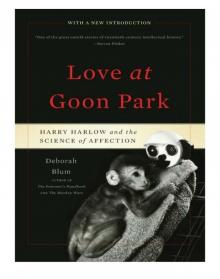 Love at Goon Park: Harry Harlow and the Science of Affection
Love at Goon Park: Harry Harlow and the Science of Affection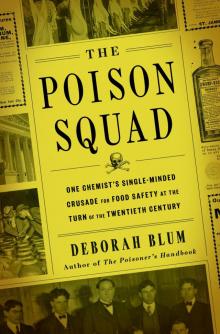 The Poison Squad
The Poison Squad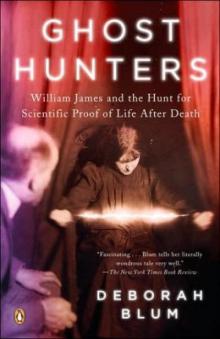 Ghost Hunters: The Victorians and the Hunt for Proof of Life After Death
Ghost Hunters: The Victorians and the Hunt for Proof of Life After Death The Poisoner's Handbook
The Poisoner's Handbook Angel Killer
Angel Killer The Best American Science and Nature Writing 2014
The Best American Science and Nature Writing 2014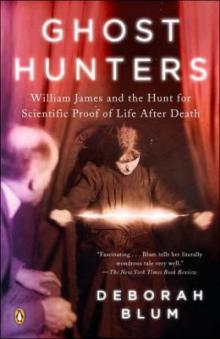 The Ghost Hunters
The Ghost Hunters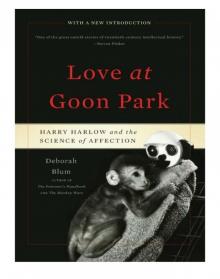 Love at Goon Park
Love at Goon Park